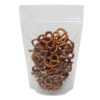Blog
Finite Focus – Avoiding Distraction to Find the Solution
One of the main shrug-quotes of our time is “We’re too easily distracted,” spoken as we input the password into our smartphone or open another tab on our laptop. It seems that the more distractible we get, or at least, the more our tendency toward distraction becomes visible, the more focused we are on, well, focus. “We’re obsessed with relentless focus,” writes Sam McNerney at BigThink.com. “We assume that if we encounter a difficult problem the best strategy is to chug red bull or drink coffee. Drugs including Adderall and Ritalin are prescribed to millions to improve focus,” and are abused by, possibly, millions more; “Taking a break is a faux pas, mind wandering even worse.”
Surprisingly and, in my mind, thankfully, recent studies seem to rebuke these ideas. Creativity, they say, may benefit specifically from letting your mind become distracted and wander about freely. One study of undergraduate students seemed to show that allowing one’s mind to wander resulted in more creativity and creative output. Anecdotally, I know that there are times when I’m trying to remember something or come up with a problem’s appropriate solution and letting it slip to the periphery of my mind results in a much more efficient result than staring it in the face directly and rigorously.
Other similar studies to the one above have also revealed that there are unconscious processes at work that are often more efficient than the conscious, especially when the conscious is redirected or relaxed, as when it is distracted. This is referred to as an incubation period. And can be found anecdotally throughout history prior to these scientifically supportive studies.
Archimedes has been studying displacement so rigorously that it is said he forgot to bathe and his friends eventually had to force him to do so, meaning that he was also forced to abandon the studies he had obsessively been attending to without break or distraction. It was when he was away from the problem consciously, dipping his body into the bath, that he discovered the very answer that had been eluding him.
Kary Mullis won the Nobel prize for biochemistry and changed chemistry as he knew it when he went into a period of incubation. He had been voraciously trying to understand DNA replication when he took a break and went for a drive; the answer hit him in such a way that he had to pull over to the side of the road.
And, for a more popular culture reference, in the film Back to the Future, Doc discovers the secret to time travel when he is working on some home repair in his bathroom. He falls, hits his head, and wakes up to the image of the Flux Capacitor and soon had developed a time-traveling Delorean. This is clearly inspired by the famous apple falling from the tree and revealing the truth of gravity to Isaac Newton who had been contemplating how the orbit of the moon around the Earth and the Earth around the sun worked. The answer came to him as he lounged in the shade, allowing his focus some freedom and the subconscious mechanics to work their magic.
In the business world, whether as a worker or a manager, this is an important consideration. James Heskett wrote for Forbes in 2014 on this very topic: “For years we have been admonished as managers to maintain focus: design strategies centered around focused factories that produce better goods less expensively, weed out the product line” and essentially find the ways to increase focus and minimize distraction in order to increase productivity and minimize time wasted.
Heskett writes, however, that “sometimes focus can be detrimental to our health, both individually and organizationally.” You’ve likely played one of these brain games where you’re told to focus on a specific aspect of a scene, like counting the number of times a basketball is passed among players, only to find out that your focus has distracted you from something else either extraordinary or ultimately more important than the task assigned. Once I played along in such a game with the documentary series available on Netflix, Brain Games; the viewer was asked to count the number of ball passes or something but then, some ways into the event, a scrolling sign at the top of the screen told the viewer the exact number of passes, meaning that I no longer had to count them individually.
“Too much focus is one of the several causes of our inability to notice,” Heskett continues, concluding his article not with advice, but with a question: “Is this an argument for leaders to disrupt focus from time to time? If so, how?” How much, should also be added to that list.
Businesswoman, Tara Hunt, supports the idea that tunnel-vision focus can be detrimental to a business’ success. She was advised when starting her own business to have a “laser focus” and she writes that this “accomplished the exact opposite” of success.“ So I started working out again and those moments away from my screen were the ones in which I came up with the best solutions. I started hanging out with friends again and realized that their work and lives and our conversations provided excellent fodder for better ideas, not to mention good feedback that I had missed out on. I read books for pleasure and watched movies to escape and when I got back to my desk, I made connections between those unfocused moments and my ideas.”
In 2015, Kate Bartolotta wrote for The Huffington Post how taking breaks at work improves productivity. She quotes recent studies which showed that workers who allow some sort of distraction approximately once per hour showed increased productivity compared with those who had retained that sort of “laser focus” Tara mentioned in her article. Kate writes that taking some space from whatever work you’re working on is a great way to recharge both your energy and creative capabilities. She also notes that the sedentary aspect of most desk jobs is not beneficial to creative processes and productivity and that getting a regular amount of physical movement throughout the day is not only much better for your health but also better for your work output. She also recommends taking the time to prepare a cup of tea or something similarly meditative that will slow you down, get your breathing normally, especially when you’re into that late-afternoon lull; caffeinated tea will also give you that boost to make it the last mile without over-wiring you for the rest of your evening. Finally, she recommends working out or doing something invigorating or playful halfway through the day to increase your ability and desire to work. My mother is a receptionist and she had benefitted in terms of her physical health, mood, and productivity by implementing a lunchtime walk every day that she can.
Whether you’re a worker, a manager or a freelancer, give consideration to the benefit of breaks, distractions and a little loss of focus; it’s so good for all of us in so many ways that it seems almost criminal to not take it to heart.





